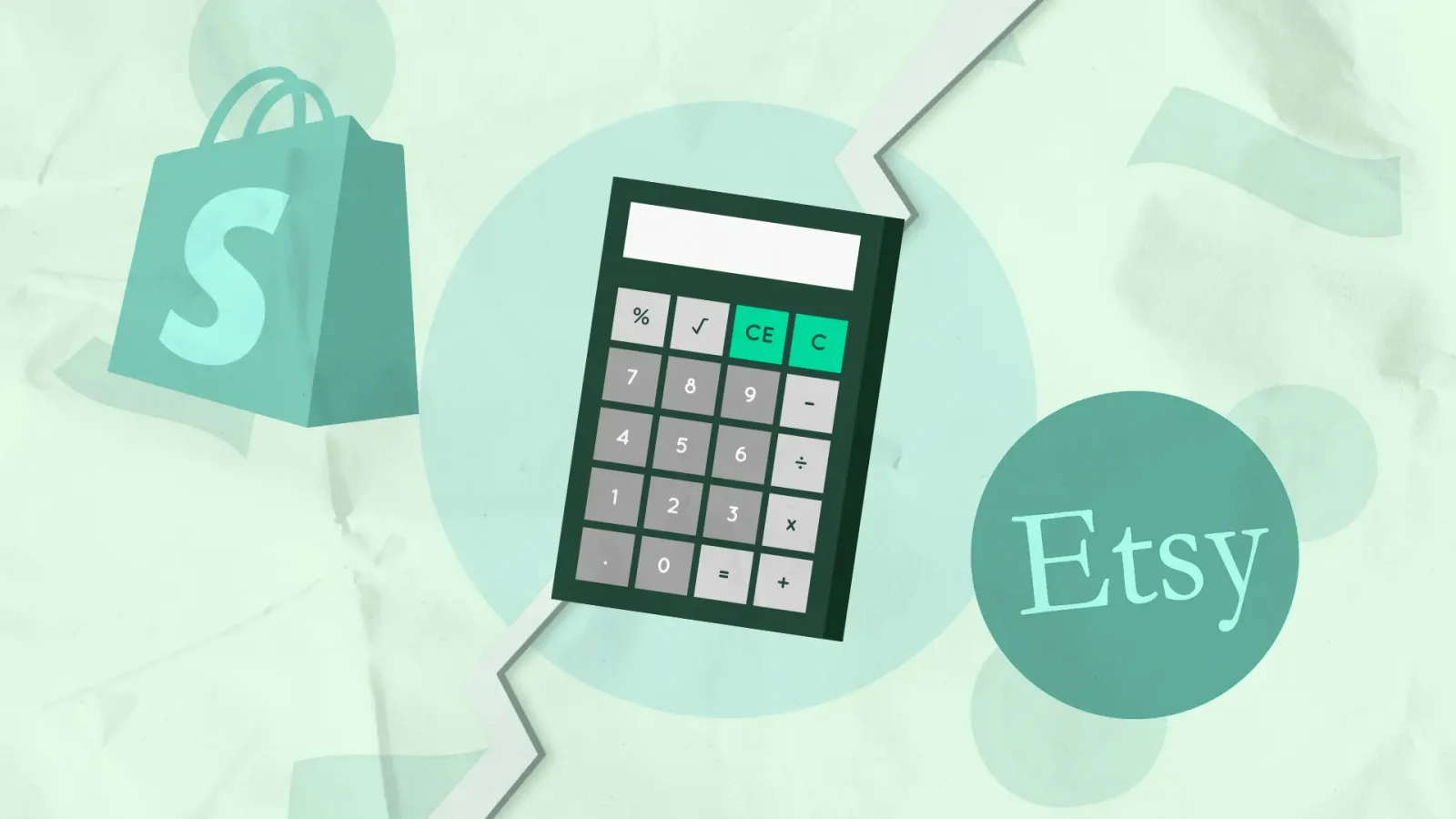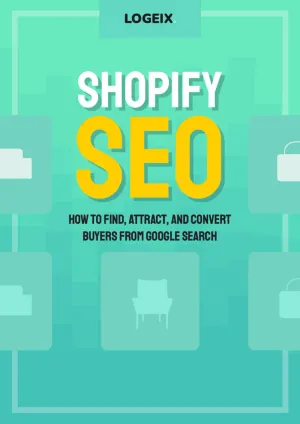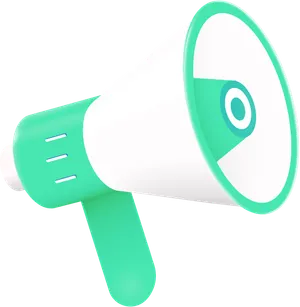The Ultimate Shopify vs. Etsy Pricing Guide

When you’re ready to sell products online, one of the first major decisions is picking the right marketplace to sell them on. Many small business owners find themselves wondering: Should I open my store on Shopify or Etsy? Which one is cheaper to start, which one is better long-term?
If you really want to do your due diligence and avoid any surprises, read our extensive guide on Shopify vs. Etsy here. If all you’re after is a comparison of the fees associated with both platforms and an aid in deciding which one’s right for you, keep reading; we’ve got you covered with this Shopify vs. Etsy Pricing Guide.
Quick Overview of Shopify vs. Etsy
Before we get into the fees you can expect for your Shopify or Etsy shop, let’s briefly clear up what distinguishes the two platforms.
Both Shopify and Etsy are incredibly well known by users worldwide. Massive eCommerce stores (like Gymshark, Tesla, Red Bull, or Sephora) are supported by Shopify, while Etsy generally attracts more buyers and sellers of vintage, hand-made, artisan or craft items (though there are certainly other, even digital, products for sale on the platform).
The second major distinguishing factor is that Etsy is a digital marketplace with a pre-existing customer base. When you open your store and manage to rank your products well, customers can easily discover your products and purchase directly from you (oftentimes with a payment method saved across the entire Etsy marketplace).
A Shopify store, on the other hand, will require you to build your own audience and drive traffic to your store externally. Think of it as a stand-alone store rather than a stall at a market.
Now that we’ve cleared up the primary differences in functionality between Etsy and Shopify, we can dive into the financial side of things.
Shopify Fees
Shopify is designed to cater to brands of all sizes. Whether you’re starting fresh and just trialing an idea or selling multiple million dollars worth of products every single month, Shopify has a plan for you.
Most new or small shops will start with Shopify’s Basic plan - their most popular option in 2024, currently priced at $39/month. This plan gives you everything you need to create your shop, ship products, and process and receive payments internationally.
To cater to brand-new shops and those who don’t need fancy functionalities quite yet, Shopify offers their Starter plan for $5/month, which allows users to set up a shop within minutes and sell their products via social media and messaging apps.
On top of monthly subscription fees, you can expect to encounter:
- 2.4-2.9% +30¢ credit card processing fees
- 0.5-2% transaction fees (unless you’re using Shopify payments)
- Optional fees for apps, themes, or designs for customization
- Domain name maintenance cost (varies, but averages about $12/year)
You can try Shopify for free to explore its functionality before purchasing a plan, and can always upgrade to more comprehensive plans down the road as your business grows.
Etsy Fees
Unlike Shopify, Etsy doesn’t charge monthly fees to keep your store up and running. So how does Etsy make its money? (Spoiler: through plenty of other fees.)
Whenever you develop a new product, you’ll create a listing in your Etsy store. Said listing costs 20¢ to create, and needs to be renewed every 4 months to remain visible.
Depending on the number of SKUs in your store, this fee can add up quickly (or remain reasonable), but either way, it will only be charged once your listing goes live on the Etsy marketplace and becomes visible to potential customers. Note that some product listings may have up to 999 quantities (only requiring one 20¢ listing fee) while others are single-quantity listings that will need to be renewed each time you make a sale.
Besides the listing fee, Etsy takes a relatively hefty
- 6.5% of each transaction your store makes,
- 3% + 25¢ to process each payment made in your store, and
- 5% of your total shipping charges
All three of these are your responsibility as the store owner and are not added to the customer’s bill.
Shopify vs. Etsy Fees: Comparing the Costs
| Fee Type | Shopify | Etsy |
|---|---|---|
| Subscription Fee | Varies by Plan: * Starter: $5/m * Basic: $39/m * Shopify: $105/m * Advanced: $399/m * Shopify Plus: from 2k/m | None required. Optional: * Etsy Plus: $10/m (for listing credits and ad credits) * Etsy Pattern: $15/m (to build your own online store separate from Etsy Marketplace) |
| Listing Fees | None | 20¢ per listing |
| Transaction Fees | * None with Shopify Payments * 0.5-2% on others | 6.5% |
| Payment Processing Fees | Varies by Plan: * Basic: 2.9% + 30¢ * Shopify: 2.6% + 30¢ * Advanced: 2.4% + 30¢ * Plus: 2.15% + 30¢ | 3% + 25¢ |
| Other Costs | * Domain Maintenance: (avg $12/year) * Themes, designs, apps, customization, integrations | * Regulatory Operating Fees (in Non-US countries) * In-Person Transaction Fees: 20¢/transaction |
As we can see from this comparison, Shopify may cost more to start, but Etsy’s combined fees put a greater dent into your profit margins for each product you sell.
Other Factors to Consider
Aside from the fees associated with each platform, it’s important to consider the long-term growth possibilities and the aforementioned functionality differences that each platform provides.
In the case of a Shopify store, while you’re going to be responsible for driving traffic and getting your products out there, you own everything about your store. If Shopify were to collapse in the future, you’d own your marketing lists and customer base entirely. On Etsy, you get exposed to an existing customer base, but Etsy owns said customers’ data. You’ll still have to promote your products on the platform, via ads, or social media.
Shopify Pros and Cons
| Pros | Cons |
|---|---|
| You own your store and customer base | No built-in audience |
| Gives full control over marketing | Higher monthly subscription fees |
| Overall lower fees |
Etsy Pros and Cons
| Pros | Cons |
|---|---|
| Built-in audience | You don’t own your customer base, Etsy does |
| Easy to start and set up | High fees for each transaction |
Conclusion
Which platform is right for you ultimately depends on the type of store you want to run, how big you want to grow it, and how much control you’d like to have over your marketing efforts. In our opinion, Etsy is a great place to start your small business, but Shopify is the more sustainable option that allows for optimal growth and ownership over your business.
Start an Etsy store, earn your first few customers, and raise awareness of your Shopify store to earn higher profits and better functionality long-term.
More eCommerce Reading
Looking to start your own eCommerce business? Check out these articles:

